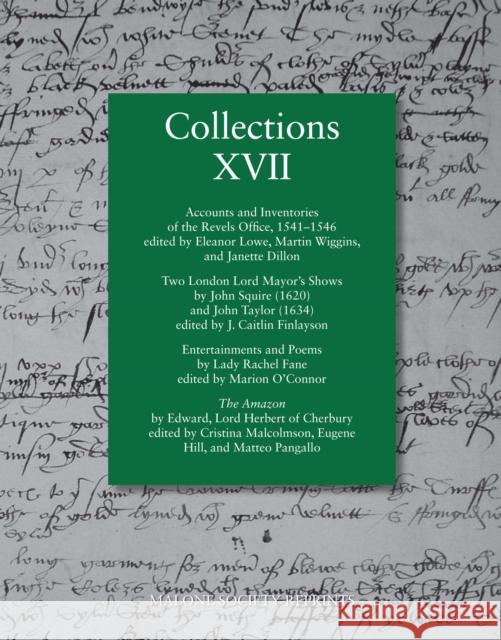Collections XVII » książka
Collections XVII
ISBN-13: 9780719099274 / Angielski / Twarda / 2016 / 104 str.
Collections XVII is the latest volume in the Malone Society's pioneering series of editions of miscellaneous documents relating to English theatre and drama before 1642. It is likely to be of special interest not only to early theatre historians but to those working on Tudor and Stuart court and civic culture, manuscript writing, household drama and early modern women's writing, publishing new material in each of these fields. The volume opens with the 'Accounts and Inventories of the Revels Office, 15411546' (edited by Eleanor Lowe, Martin Wiggins, and Janette Dillon). These accounts and inventories are the foundational documents for understanding the court masque in the last years of Henry VIII, and the operation of the Revels Office during the early incumbency of the first permanent Master of the Revels, Sir Thomas Cawarden. The next item is an edition of The Amazon, a play fragment, written by Edward Herbert, first Baron Herbert of Cherbury and brother of the poet, George Herbert (edited by Cristina Malcolmson, Matteo Pangallo and Eugene Hill). Though incomplete, Herbert's entertainment represents a fascinating intervention in the debate about women or querelles des femmes popular on the Continent and in early seventeenth-century England. The watermark dates the paper to 1623-24, and internal evidence suggests that the work was intended as a household entertainment for the Sidney-Herbert coterie. Item three is Marion O'Connor's edition of 'Entertainments and Poems' by Lady Rachel Fane. Based on a unique manuscript preserved in the Kent History and Library Centre in Maidstone, this edition presents eleven texts written by Fane during her teenage years, including a prologue to a Christmas entertainment, a couple of masques, a pastoral entertainment, a fragment of a tragicomedy and poetry. Much of this material is previously unpublished. As well as shedding new light on Caroline country house theatricals and on Fane's writing career, this edition of her manuscript will be an important contribution to early modern women's studies. The final item in the volume is J. Caitlin Finlayson's edition of two London Lord Mayor's Shows, the first written by well-known "Water-Poet" and chronicler, John Taylor, The Triumphs of Fame and Honour (1634) and the second, The Tryumphs of Peace (1620) by John Squire, Vicar of Shoreditch. Together, these texts offer fascinating insights into the relationship between print and performance, the scope of local and global concerns expressed in civic entertainments, and the material workings of civic theatre and display in early modern London, complementing the insights offered elsewhere in the volume into courtly and aristocratic theatrical culture.











